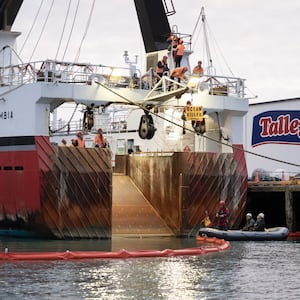World
Greenpeace Activist Arrested During Trawler Protest in Nelson

A Greenpeace activist was arrested this morning after staging a protest on a fishing trawler at Nelson Port in New Zealand. The incident occurred shortly after 8:00 a.m. when two activists boarded the Talley’s factory trawler, the Amaltal Columbia. One activist climbed the stern of the vessel and unfurled a large banner that read “OCEAN KILLER,” drawing attention to environmental concerns associated with commercial fishing practices.
The Tasman District Police confirmed their response to the situation, emphasizing that while they respect the lawful right to protest, they cannot condone actions that jeopardize public safety. A police spokesperson stated, “Police recognise the lawful right to protest; however, we cannot condone activities which put members of the public and our staff at risk.”
Details of the Protest
The protest aimed to highlight the ecological impact of overfishing and the practices employed by commercial fishing companies. Activists from Greenpeace regularly engage in direct action to advocate for marine conservation and to raise awareness about the threats faced by ocean ecosystems.
In this instance, the activists sought to draw attention to the operations of Talley’s, a significant player in the New Zealand fishing industry. The company has faced criticism in the past regarding its environmental practices. By choosing to target the Amaltal Columbia, the protesters aimed to disrupt operations and spark public discourse on sustainable fishing.
Reactions from Talley’s and Environmental Groups
Talley’s has not yet issued a formal statement regarding the protest or the arrest. However, the company typically defends its practices, citing compliance with regulatory guidelines and a commitment to sustainable fishing methods. The incident at Nelson Port has reignited discussions within environmental circles about the balance between industry and conservation efforts.
Greenpeace has a long history of activism aimed at protecting marine life. The organization argues that aggressive fishing practices contribute to the decline of fish populations and harm marine biodiversity. They advocate for stronger regulations and practices that prioritize environmental sustainability.
As the situation at Nelson Port unfolded, it underscored the ongoing tension between commercial interests and environmental advocacy. Activists and industry representatives continue to grapple with the implications of fishing practices on both local ecosystems and global marine health.
This incident serves as a reminder of the passionate efforts by activists to hold corporations accountable and to raise awareness about critical environmental issues. The ramifications of such protests extend beyond immediate arrests, potentially influencing public opinion and policy decisions related to sustainable practices in the fishing industry.
-

 World1 week ago
World1 week agoPrivate Funeral Held for Dean Field and His Three Children
-

 Top Stories2 weeks ago
Top Stories2 weeks agoFuneral Planned for Field Siblings After Tragic House Fire
-

 Sports3 months ago
Sports3 months agoNetball New Zealand Stands Down Dame Noeline Taurua for Series
-

 Entertainment3 months ago
Entertainment3 months agoTributes Pour In for Lachlan Rofe, Reality Star, Dead at 47
-

 Entertainment2 months ago
Entertainment2 months agoNew ‘Maverick’ Chaser Joins Beat the Chasers Season Finale
-

 Sports3 months ago
Sports3 months agoSilver Ferns Legend Laura Langman Criticizes Team’s Attitude
-

 Sports1 month ago
Sports1 month agoEli Katoa Rushed to Hospital After Sideline Incident During Match
-

 World2 weeks ago
World2 weeks agoInvestigation Underway in Tragic Sanson House Fire Involving Family
-

 Politics2 months ago
Politics2 months agoNetball NZ Calls for Respect Amid Dame Taurua’s Standoff
-

 Top Stories2 weeks ago
Top Stories2 weeks agoShock and Grief Follow Tragic Family Deaths in New Zealand
-

 Entertainment3 months ago
Entertainment3 months agoKhloe Kardashian Embraces Innovative Stem Cell Therapy in Mexico
-

 World4 months ago
World4 months agoPolice Arrest Multiple Individuals During Funeral for Zain Taikato-Fox















